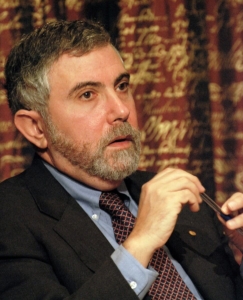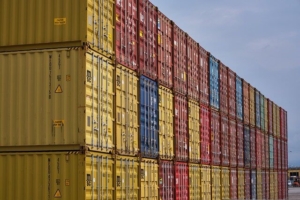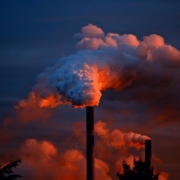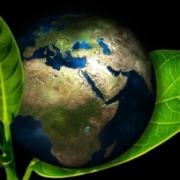Growth and Free Trade: Brain-Dead Dogmas Still Kicking Hard
by Herman Daly
There are two dogmas that neoclassical economists must never publicly doubt, lest they are defrocked by their professional priesthood: First, that growth in GDP is always good and is the solution to most problems; second, that free international trade is mutually beneficial thanks to the growth-promoting principle of comparative advantage. These two cracked pillars “support” nearly all the policy advice given by mainstream economists to governments.
Even such a clear thinker as Paul Krugman never allows his usually admirable New York Times column to question these most sacred of all tenets. And yet, in less than 1,000 words the two dogmas can easily be shown to be wrong by just looking at observable facts and the first principles of classical economics. Pause and calmly consider the following:

Krugman, an economist who writes for the New York Times, religiously supports the cracked pillars upheld by mainstream economists. (Image: CC0, Credit: Prolineserver).
(1) Growth in all micro-economic units (firms and households) is subject to the “when to stop rule” of optimization, namely, stop when rising marginal cost equals declining marginal benefit. Why does this not also apply to the growth of the matter-energy throughput that sustains the macro-economy, the aggregate of all firms and households? And since real GDP is the best statistical index we have of aggregate throughput, why does it not roughly hold for growth in GDP? It must be because economists see the economy as the whole system, growing into the void—not as a subsystem of the finite and non-growing ecosphere from which the economy draws resources (depletion) and to which it returns wastes (pollution). When the economy grows in terms of throughput, or real GDP, it gets bigger relative to the ecosystem and displaces ever more vital ecosystem functions. Why do economists assume that it can never be too big, that such aggregate growth can never at the margin result in more illth than wealth? Perhaps illth is invisible because it has no market price. Yet, as a joint product of wealth, illth is everywhere: nuclear wastes, the dead zone in the Gulf of Mexico, gyres of plastic trash in the oceans, the ozone hole, biodiversity loss, climate change from excess carbon in the atmosphere, depleted mines, eroded topsoil, dry wells, exhausting and dangerous labor, exploding debt, etc. Economists claim that the solution to poverty is more growth—without ever asking if growth still makes us richer, as it did back when the world was empty, or if it has begun to make us poorer in a world that is now too full of us and our stuff. This is a threatening question, because if growth has become uneconomic, then the solution to poverty becomes sharing now, not growth in the future. Sharing is now called “class warfare.”
(2) Countries whose growth has pushed their ecological footprint beyond their geographic boundaries into the ecosystems of other countries are urged by mainline economists to continue to do so under the flag of free trade and specialization according to comparative advantage. Let the rest of the world export resources to us and we will pay with exports of capital, patented technology, copyrighted entertainment, and financial services. Comparative advantage guarantees that we will all be better off (and grow more) if everyone specializes in producing and exporting only what they are relatively better at and importing everything else. The logic of comparative advantage is impeccable, given its premises. However, one of its premises is that capital, while mobile within nations, does not flow between nations. But in today’s world, capital is even more mobile between countries than goods, so it is absolute, not a comparative advantage that really governs specialization and trade. Absolute advantage still yields gains from specialization and trade, but they need not be mutual as under comparative advantage—i.e., one country can lose while the other gains. “Free trade” really means “deregulated international commerce”—similar to deregulated finance in justification and effect. Furthermore, specialization, if carried too far, means that trade becomes a necessity. If a country specializes in producing only a few things, then it must trade for everything else. Trade is no longer voluntary. If trade is not voluntary then there is no reason to expect it to be mutually beneficial and another premise of free trade falls. If economists want to keep the world safe for free trade and comparative advantage, they must limit capital mobility internationally; if they want to keep international capital mobility, they must back away from comparative advantage and free trade. Which do they do? Neither. They seem to believe that if free trade in goods is beneficial, then by extension free trade in capital (and other factors) must be even more beneficial. And if voluntary trade is mutually beneficial, then what is the harm in making it obligatory? How does one argue with people who use the conclusion of an argument to deny the argument’s premises? Their illogic is invincible!

Economists believe that if free trade in goods is beneficial, then by extension, free trade in capital must be more beneficial. (Image: CC0, Credit: mrcolo).
Like people who can’t see certain colors, maybe neoclassical economists are just blind to growth-induced illth and to the destruction of the national community by global integration via free trade and free capital mobility. But how can an “empirical science” miss two red elephants in the same room? And how can economic theorists, who make a fetish of advanced mathematics, persist in such elementary logical errors?
If there is something wrong with these criticisms, then some neoclassical colleagues ought to straighten me out. Instead, they lamely avoid the issue with attacks on nameless straw men who supposedly advocate poverty and isolationism. Of course rich is better than poor—the question is, does growth any longer make us richer, or have we passed the optimum scale at which it begins to make us poorer? Of course trade is better than isolation and autarky. But deregulated trade and capital mobility lead away from reasonable interdependence among many separate national economies that mutually benefit from voluntary trade to the stifling specialization of a world economy so tightly integrated by global corporations that trade becomes “an offer you can’t refuse.”
Will standard economists ever pull the plug on brain-dead dogmas?
 Herman Daly is CASSE Chief Economist, Professor Emeritus (University of Maryland), and past World Bank senior economist.
Herman Daly is CASSE Chief Economist, Professor Emeritus (University of Maryland), and past World Bank senior economist.







There is at least one example of a more-or-less mainstream economist breaking out of the dogma – it is Dani Rodrik. His “Globalization Paradox” (whose consequences for sustainability I tried to analyze here) is a powerful attack on the free-trade-is-beneficial-for-all dogma.
Mr. Daly,
Thank you for another insightful article.
There is another aspect of GDP and neoclassical economics which deserves attention. A free market is assumed to foster the most efficient allocation of resources through the mechanism of competition and comparative advantage. It does not take a complex statistical analysis to observe violations of this principle every day with cumulatively large consequences.
I live in a rural area where the timber industry has major operations. Every day I see fully loaded logging trucks passing my house, in both directions. Unless that somehow no one has to pay for the diesel fuel, sending the logs on crossing paths to their respective mills results in lost efficiency and increased costs. Comparative advantage almost never happens in the real world the way that economists think it does, because perfect knowledge of the market place doesn’t exist, and a great deal of trade is in like products, not substitutions or specialization.
Millions of people commuting to work each day in crossing paths to essentially interchangeable jobs is not a mark of efficiency. California wines sold in France, and French wines sold in California is not an example of comparative advantage in international trade, it is a sign of inefficiency. The one thing these activities does do is grow GDP. Thus it could be argued that measuring economic status through GDP actually encourages resource waste and depletion.
Now I’m not a fan of planned economies, I think we’ve seen enough of that experiment too. What I think would help is if we looked at GDP with a new filter. We can start by saying that GDP is an indicator of resource depletion. (Maybe there is a better indicator of that somewhere, but I’ll take it as a starting point). If one could keep track of ‘H’appiness in your citizens and ‘H’ealth in the environment, one could say something about sustainability by looking at the HH/GDP ratio. You would have a good thing going when HH rises and GDP is declining.
Certainly anyone who has completed Econ-101 with a “C” or better can comprehend the merit of Professor Daly’s concisely put argument.
So why can’t our policy and decision makers see the obvious? Because the truth would knock the knees completely out from under their chosen professions, tenure, careers, wealth, position power and even their self esteem. It’s just too damn scary. CASSE’s more formidible challenge is the human ego and its defense mechanisms.
Jack Davis
“It is difficult to get a man to understand something when his salary depends on his not understanding it.” Upton Sinclair
People only accept change when they are faced with necessity, and only recognize necessity when a crisis is upon them. Jean Monnet
Thank you, Professor Daly. Your message, while clear and obvious, cannot be repeated too often! The answer to your final question is, of course, “No, people whose salaries depend on not understanding how the world really works will not suddenly see the truth and embrace the wisdom of the steady state economics paradigm.”
Economics is not about allocating scarce resources, it is about sharing plentiful resources. The basic transaction is not an exchange of cash for goods or services, it is a gift. We are not able to create anything that life depends on: all of it is provided as a gift from Nature. In a cash economy, a dollar is worth much more to a poor person than a rich person; hence, more equal distributions of wealth and income are not only more just, they are also more efficient. The smallest conception of the economy that makes any sense would have to comprise the Earth and the Sun. Everything we have is built using the five elements of energy, natural resources, time, knowledge, and ingenuity.
Economics should be based on these and other principles that are simple and demonstrably true. We need ways of understanding and teaching about the economy that can be grasped by children. Above all, we need an economics that supports good public policy decision making.
I would like to enlist others who are interested to develop a paradigm – a new approach to economics – based on how things really are.
Rising marginal costs are a dogma of neoclassical economics. In the real world, as study after study shows, marginal costs are flat or falling, so long as there is unused capacity. And since this is always the case (capacity utilization rarely exceeds 85%, even in booms, and never 90) marginal costs fall rather than rise. The whole of neoclassical econ textbooks are simply wrong, as a matter of fact.
“What the commodity markets are telling us is that we’re living in a finite world, in which the rapid growth of emerging economies is placing pressure on limited supplies of raw materials, pushing up their prices. And America is, for the most part, just a bystander in this story.”
— From “The Finite World” by Paul Krugman, December 26, 2010
http://www.nytimes.com/2010/12/27/opinion/27krugman.html
Was this NYT op-ed a brief moment of “public doubt”? Should we assume that Krugman’s endless advocacy of higher spending to achieve growth to achieve full employment stems from fear of his “professional priesthood”?
Krugman does not exist in the kind of bubble in which leaders like Obama are able to hide themselves. Can no one corner Krugman and beat him about the head (preferably metaphorically) until he either answers the questions posed by Herman Daly or confesses to routinely lying for money?
It’s frustrating and ridiculous that Krugman and his ilk are allowed to get away with their nonsense without being publicly called out on it.
Professor Daly,
thankyou for this concise shredding of the economic orthodoxy. The ease and clarity with which you achieve it indicates the degree of malfeasance/stupefaction among those who still propound economic growth as the only game in town.
The difficulty we face is that we have no longer any prospect of economic growth leading to an economic steady state (or, more realistically, a ‘dynamic equilibrium economy’ [DEE]). We instead have an economic house of cards, with dreadful commitments to catastrophic losses in the event of its collapse. Getting to ‘DEE’ is thus fraught with the risks of a crash landing, with relatively few survivors. Just the climate destabilization already ‘in the pipeline’, plus the loss of the cooling ‘sulphate parasol’, indicate that the survivors’ chances of establishing even a stable agrarian society would be slim under the loss of global economic coherence.
In this light it seems urgent that the benign alternative to globalization under ‘free trade’ dogma is better explored and described. The notion of ‘Trade Stewardship’ – whereby export-goods are indexed for their production’s social and ecological merits, and are then tariffed only by importing countries whose equivalent home produce is of higher index value (with revenues ring-fenced to advancing sustainability in the exporter’s home production) offers a mode of the regulation of trade that actively values and mutually advances the sustainability of production, and thus harnesses the immensely potent dynamic of trade to this benign end.
As the necessary alternative to foreseeably rising protectionism and confrontation, Trade Stewardship offers a path towards the desired steady state economy. It would be a real advance of the debate over trade if a person of your standing would consider posting a new essay on its merits and the requirements for its global adoption.
Regards,
Lewis Cleverdon